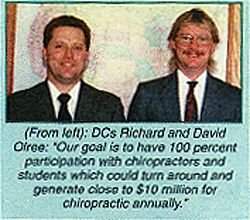
A new opportunity to increase chiropractic funding has just been developed by two chiropractic brothers from Hillman, Michigan, Richard and David Olree, who have established a program that goes by the acronym CARDS (Chiropractic Advancing Research, Development and Education).
The program is simple and beneficial to subscribers and the chiropractic profession. Using the services of Frontier, the fifth largest long distance company in the U.S., DCs and chiropractic students are able to make long distance calls anywhere, anytime in the continental U.S. for only 13 cents per minute. There are no restrictions or minimums. The billing increments are every six seconds, unlike the billing by the minute that many companies use. Another plus is that chiropractic patients can join the program and pay only 15 cents per minute with the same advantages.
Before "DC" accepted 13 cents as a good rate, we asked CARDS for a comparison on our phone bill. Our organization has a former phone company employee who has established what we believed to be the best rate available. CARDS showed us we could reduce our bill by almost $900 per year, while donating back to the profession over $1,000 for the year.
Depending on which phone service you are currently using, you can expect to save 30-60 percent on your long distance calls. Consider what your savings would add up to over the years.
The beauty of the program is that while you're saving on long distance rates, 13 percent of the money you pay will be donated back to the chiropractic profession. You decide where in chiropractic the money goes. You make the choice between national and state chiropractic associations, chiropractic colleges and chiropractic research organizations.
"We took a look at the numbers and projected that chiropractors spend approximately $5 million monthly on long distance phone service with virtually no return back to the profession," explained David Olree, DC. "With the deregulated utility, the opportunity to generate monies to be redirected to the chiropractic colleges or chiropractic state or national organizations, as well as chiropractic research and development, is there."
"Right now there are approximately 51,000 chiropractors and 10,000 chiropractic students across the United States. The chiropractors alone are paying over $5 million a month in long distance with no return to the profession, and students are paying over $750,000. Our goal is to have 100 percent participation with chiropractors and students which could turn around and generate close to $10 million for chiropractic annually."
"We'd like to see chiropractic research and development prosper," Dr. Richard Olree added. We'd like to see, every time the phone is picked up, money going to college scholarship funds to ease the burden of students; allowing state associations more financial resources to hire a larger staff so that they can increase their PACs; and on a national level, allow more money to go into lobbying for chiropractic inclusion."
Is the process complicated? "Specifically, what it will take is one call to CARDS to get the information and CARDS will switch the long distance carrier," Dr. Richard Olree explained. "It takes just a few minutes of your time to experience extremely good rates and fiber optic services. A DC will never even notice that they switched. There is no cost involved in switching your long distance carrier and, your phone number(s) stay the same."
Editor's note: You may contact CARDS at 800 797-5254. Fax: 517 742-2155.
Dynamic Chiropractic editorial staff members research, investigate and write articles for the publication on an ongoing basis. To contact the Editorial Department or submit an article of your own for consideration, email
.




